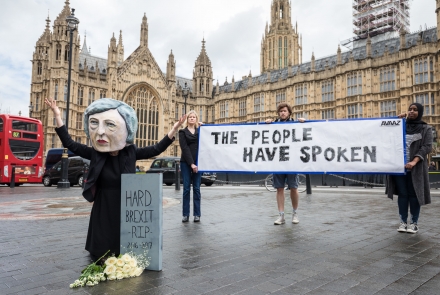
PHOTO :Avvaz on Flickr https://www.flickr.com/photos/avaaz/35064937971/
Stand up and deliver
Theresa May promised a ‘strong and stable’ government for the UK. What the country has ended up with is far from that, but that may be just what voters intended, Quentin Grafton writes.
Seven weeks ago Prime Minister Theresa May stood outside in Downing Street to announce an early election saying she needed a strong mandate from the people to negotiate Brexit on her terms. But instead of winning a landslide, as many pollsters claimed was possible at the start of the campaign, her British Conservative Party has gone backwards, despite an increase in its popular vote from 2015. The Conservative Party lost 13 seats, not to mention the majority won by David Cameron in 2015. Meanwhile, Labour performed much better than two years ago, increasing its share of the popular vote by 10 per cent and gaining 30 additional seats.
The Conservatives (Tories) will now govern on the whim of the Democratic Unionist Party, a last century throwback party that includes climate change deniers and anti-abortionists. This is anything but ‘Strong and Stable’ government promised ad nauseam by Theresa May during the election campaign.
Many pundits are horrified at the prospect of a weak and unstable government, just as the United Kingdom begins negotiations with the EU over Brexit. For many Britons and Northern Irish, however, this outcome might just be what they wanted – a minority Tory Government that needs to be more inclusive, both internally with those Tories opposed to a ‘hard Brexit’, and externally with the voters that felt isolated by May’s approach to date. It was most certainly not the case that all of the 40 per cent who voted Labour wanted Jeremy Corbyn living at 10 Downing Street.
Theresa May was fooled into thinking that a lead of about 20 per cent in the opinion polls when the snap election was announced on 18 April (and more than three years before an election was required) would result in a resounding victory for her and the Conservative Party. With hindsight, this was a very poor calculation.
For opposition leader Jeremy Corbyn there are lessons too. He must avoid the temptation to believe that he is ‘beloved by the people’. Indeed, with a different leader, Labour may well have received the keys of office on 8 June.
Swing voters typically go for the ‘lesser of evils’ rather than voting for a party or a leader with their ‘heart and soul’. Labour increased its share of the swing vote, especially among the 35-44 years old age group, many of whom want Britain to remain in the EU or are Brexiters who want a ‘softer, kinder Brexit’.
Pre-election polls predicted that Labour would do exceptionally well among younger voters, securing almost four times as many votes from the 18-24 years olds than did the Conservatives, and more than twice as many votes from the 25-34-year-olds. The Tories will form the next government only because they won over a greater proportion of voters aged 55 and older.
So what are the lessons to be learned from the UK Election? First, as other politicians have discovered to their cost, be very careful about going to an early election on a self-serving whim. If you have a mandate to govern then most voters expect you to ‘get on with it’.
Second, do not be fooled by the beauty contest of opinion polls. People can, and do, vote strategically and will punish governments even if the alternative is not what they want.
Third, many voters expect their politicians to stand for something beyond empty slogans. Theresa May wanted Britain to remain in the EU before the June 2016 Referendum and argued persuasively why the UK should not Brexit. Yet less than a year later, and as Prime Minister, she was bullish about a ‘hard’ Brexit.
In September 2016 she stated: “I won’t call a snap election” because, she said, the country needed stability, but then called a snap election anyway. For all his many faults, Jeremy Corbyn did not make such spectacular U-turns and was consistent in his messages and policies for voters. Of the two, Corbyn is paradoxically the most ‘stable’ or even authentic, at least in his political views.
Last, but not least, voters expect politicians to deliver. That is, real leaders say what they mean and then do what they say. In democracies, voters agree to hand power and prestige to politicians who they vote for, but this is about transaction, not adoration. Think of it, if you will, as the ‘politician as the plumber’. When we have a blocked toilet, none of us want a plumber to promise to come and then not show up, nor do we do want a plumber to arrive and simply talk nicely to us about unblocking the toilet and then do nothing. We certainly do not want a plumber to pretend to unblock the drain, get paid, and then drive away and forget about us. We just want the plumber to do the job and unblock the darn toilet!
Call it populism, or call it what you will, but voters simply want their elected leaders to ‘stand up and deliver’ for them, the people. In other words: Govern in the national interest rather than self-interest. Politicians who fail to understand this, or who forget the transactional nature of politics, will soon find that voters will call someone else to get the job done.
This piece was first published by Policy Forum.net, the website of the Asia and the Pacific Policy Society and Crawford School. https://www.policyforum.net/stand-up-and-deliver/
Updated: 22 November 2024/Responsible Officer: Crawford Engagement/Page Contact: CAP Web Team













